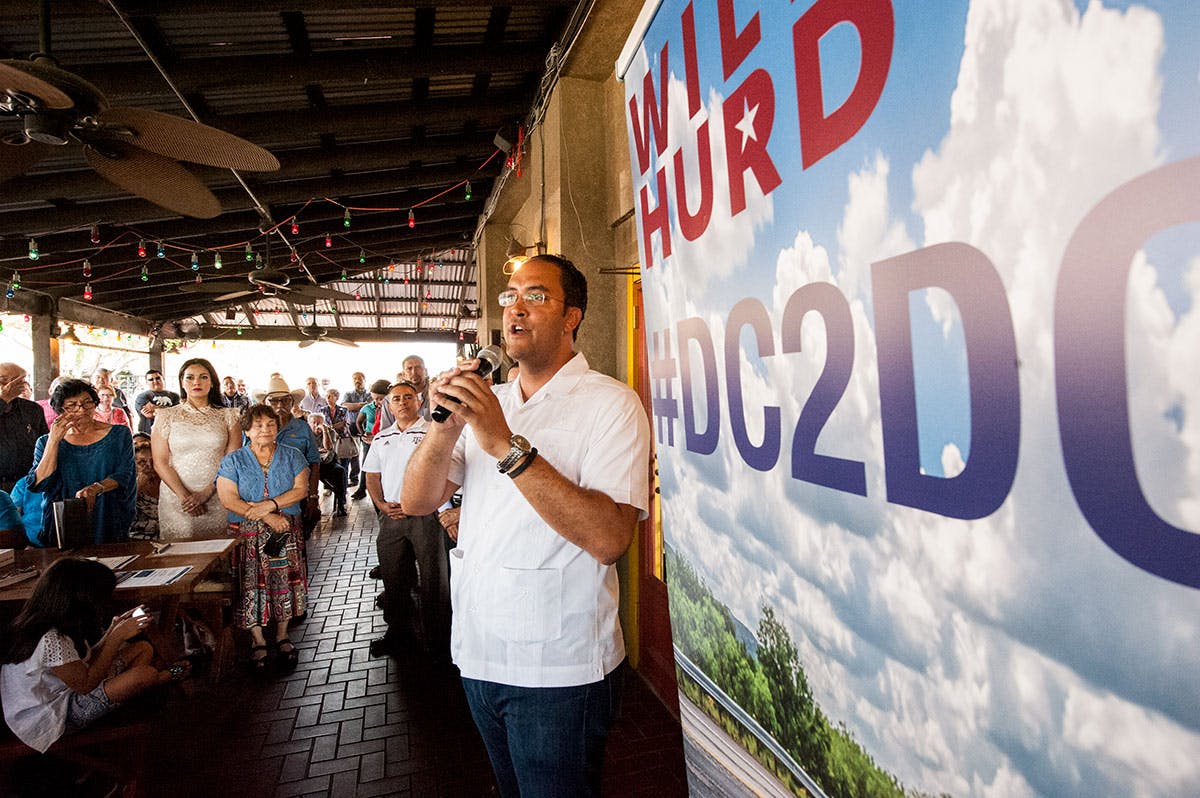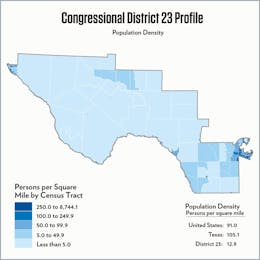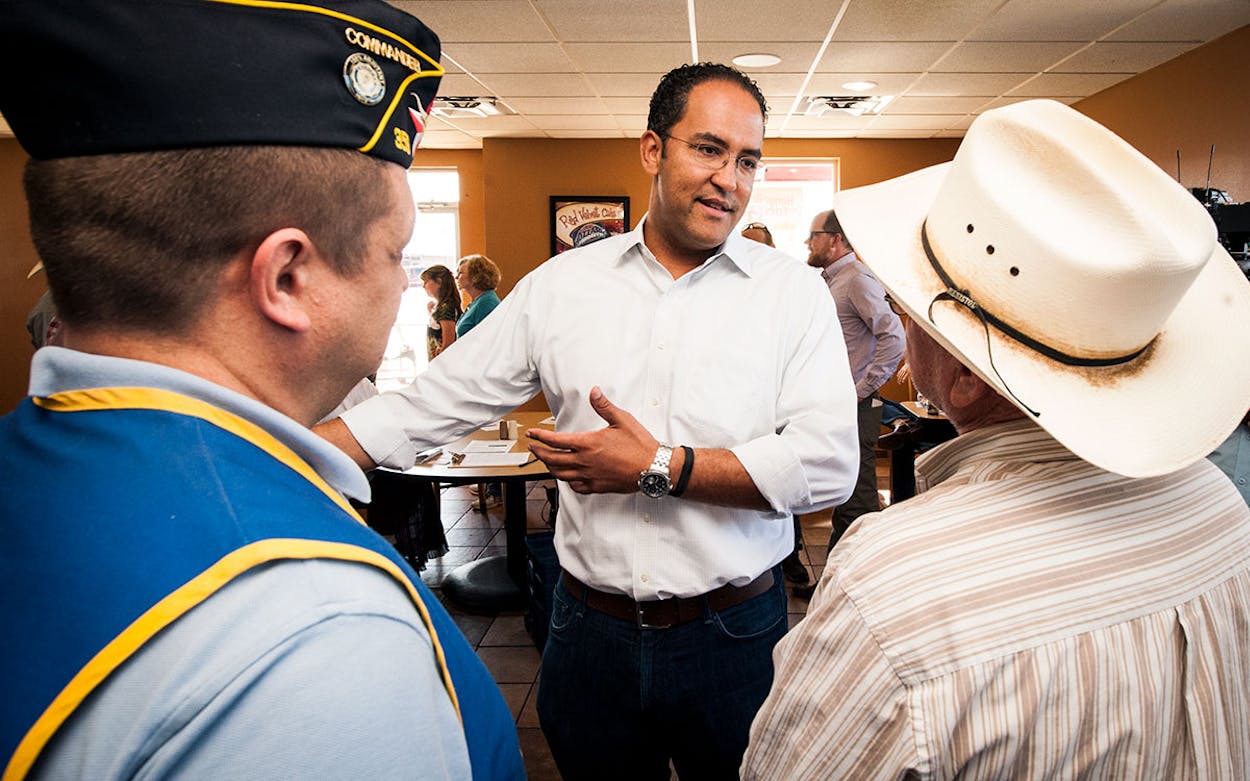The Twenty-third Congressional District of Texas sweeps across 58,000 square miles of brush country and desert, reaching from San Antonio to El Paso. The district contains 747,000 people, 189 working oil rigs, four endangered species, and one threatened member of Congress: Republican Will Hurd of Helotes.
Hurd holds one of the most competitive congressional districts in the nation, one that changed party hands three times between 2006 and his election in 2014. The national Democratic Congressional Campaign Committee earlier this year made Hurd one of its top targets after realizing presidential nominee Hillary Clinton received 4,500 more votes than Hurd as he eked out a re-election victory over Democrat Pete Gallego. So when Hurd launched his third annual DC2DQ tour this week—which involves stops at local Dairy Queens in his district—it was more than just town halls amid cheeseburgers and Blizzards. Hurd was on a road trip for political survival, winning votes one fast food restaurant at a time.
I followed the Hurd road show for just two days of its eight-day journey and put almost three hundred miles on my truck traveling through the immense district. On Thursday, Hurd agreed to briefly ride along with me and talk about his campaign during the fifty-some-odd mile drive on U.S. 83 from Carrizo Springs to Uvalde. Throughout the mobile interview, I kept both hands on the wheel—especially on that narrow bridge over the gorge at Turkey Creek—because who wants to be the journalist who put a congressman into a ditch?
As an endless vista of deer fences and thorny brush whizzed by, Hurd explained away the notion that his district is primed for a Democratic win. (Of the 23 Republican-held congressional districts carried by Clinton, most saw the re-election of the incumbent congressman by a wide margin, for example, Pete Sessions of Dallas, 28,000 more votes than Clinton, and John Culberson of Houston, 18,000.) Hurd said his re-election shows his connection to his constituents transcends national politics.
“It’s an indication of how we’re being effective,” he said. “The way we look at it is: I outperformed Donald Trump by 12,000 votes. The fact that I was able to win despite top of the ticket stuff and Hillary winning is an indication that our interactions with constituents have been only stronger.”

But though Hurd feels his connection with voters outweighs national politics, his potential for re-election may rest largely on whether he can keep the race focused on the district instead of being sucked into a nationalized referendum on the Trump presidency. Hurd has gained attention with the Washington news media as something of a Republican contrarian who is not afraid to part ways from President Trump. Hurd opposes a solid wall along the entire border, and in May he voted against the House leadership in its effort to repeal and replace the Affordable Care Act. Hurd even suggested Trump should apologize for claiming the Obama administration wiretapped Trump Tower. Still, despite his public distance from the president, FiveThirtyEight has Hurd ranked as voting in line with Trump 95 percent of the time this year.
That record and the district’s profile is already drawing Democrats toward a challenge against Hurd. Gallego, his former opponent, has created an exploratory committee. Former Clinton and Obama appointee Judith Canales of Eagle Pass also is considering the race, as is Jay Hulings, a federal prosecutor from San Antonio.
Former White House trade official Gina Ortiz Jones has already announced her candidacy. Should she get the Democratic nomination, the former Air Force intelligence officer would face off against a CIA agent who ran intelligence operations in Afghanistan and Iraq. The news media will find it nearly impossible not to portray the race as Spy vs. Spy. At the moment, however, Jones is starting with the standard Democratic line against Hurd—that he is duplicitous. “I’d find the DC2DQ road trip more interesting if Will Hurd voted in D.C. that same way he talks at the DQ,” Jones told me.
There is some truth to that. The two most damning accusations against Hurd is that he he voted in favor of repealing Obamacare during his first term and only voted against repeal this year; and that he speaks out against the border wall, but once voted to fund it. I asked Hurd about the latter.
“There were two votes. There was a vote to put $1.5 billion of wall money into the appropriations, and I voted against that. I was only one of five Republicans that did that,” he said. “The final appropriations bill included money, a pay raise for our military. It included money to all of our VA clinics and hospitals. It included money going to some of our nuclear repertory agencies that are involved in missile defense, which is important with North Korea and Iran at play. So those are things that I voted for, and this is only one part of the process.”
Putting the sour with the sweet is not an unusual leadership tactic in large omnibus bills, but Hurd’s answers on the healthcare votes were not quite as clear. “They were all different bills,” Hurd said. “The major repeal vote that President Obama vetoed last year was a very different bill than the bill that came to us this fall. And I voted against it because of a couple things. My goal has always been increased access to and decreased cost of healthcare. I don’t believe these did this. Taking $820 billion out of Medicaid does not fix Medicaid. Medicaid needs to be fixed, don’t get me wrong with that. But just taking almost $1 trillion out of it is not the way to fix the problem. So that’s why I voted against it. Again, every bill is different.”
Hurd’s flip-flop on the ACA repeal will come up time and again over next year’s election, but here is what he said in an official news release immediately after the House failed to override Obama’s veto: “Congressional Republicans proved through this legislation that repealing ObamaCare is just a matter of time. All we need is a Republican in the White House to seal the deal.”
On top of other candidates lining up, Hurd also faces the possibility that a three-judge panel this fall will redraw part of his district as part of a lawsuit challenging the state congressional district maps. Almost any redrawing of Hurd’s district would make it more favorable to Democrats by taking Republican-leaning white voting precincts out and replacing them with Democratic-leaning Latino precincts.
Michael Li, a redistricting expert with the Brennan Center for Justice, said the case is important to Democrats because they believe if the court redraws the statewide map, the party can pick up two to four seats on the road to obtaining the 24 they need nationally to have a U.S. House majority. The largest population center in the district is in Bexar County, and that is the most likely place for a population swap to occur. Gallego won the El Paso portion of the district last year by 13,600 votes, while Hurd carried Bexar by 14,000. Districtwide, Hurd won by just 3,051 votes.

Li said there also is a belief among Democrats that the district can be won by a candidate who runs a better campaign than Gallego did in either of the past two elections. As for the Republicans, “I don’t think there is any great love for Will Hurd other than that he is a vote for Paul Ryan over Nancy Pelosi as speaker of the House.”
Hurd was fatalistic about the case, but he said he believes a district that is competitive in the general election is better for the country and the national political dialogue than a district where the race is decided in either party primary. “We’re going to keep doing our thing. Be honest, tell people what you’re doing and why you’re doing it, don’t be afraid of constituents, and work hard,” he said. “And that’s what we do. And that’s why we’re seeing bigger crowds.”
The seemingly ubiquitous small town DQ restaurants served as the stage for more than half of Hurd’s nineteen town halls, while others were in barbecue joints, burger places, and an American Legion post. Hurd’s tour did not shy away from Democratic strongholds, and included visits to counties where he lost three-to-one last year. Through Thursday, none had been marked by the contentious, angry yelling that disrupted some other Republican town halls across Texas and the nation earlier this year.
In Del Rio, Hurd received questions on science and technology training for youth, and many location-specific issues, such as federal funding for the local Air Force base. Drawing on his CIA experience, Hurd was more at ease when discussing international policy. When one attendee shouted out, “North Korea,” Hurd discussed the situation as a “powder keg” that will require pressure from China to help defuse the growing nuclear crisis. Though not as bellicose as the president, Hurd displayed his inner hawk, “We also have to be prepared for the next time they do a test, we shoot it down.” Another person asked him about Trump’s tweet to ban transgender people from the military. “If you meet the military requirements and you want to serve your country, you should be able to serve. A tweet is not policy,” he said, drawing applause from about a third of the hundred-plus people at the event.
Another hundred people turned out for his event in Eagle Pass, one of the locales where Hurd was trounced last year. Some joked that the crowd consisted of every Republican in town. Overwhelmingly Hispanic, the audience wanted to hear from Hurd on what government needs to do to crack down on illegal immigration. Hurd politely told them he opposes a physical border wall, but believes the immigration laws need to be enforced. “If you enforce the law, that’s a deterrent,” he said.
In a nod to political harmony, Hurd reminded the audiences that earlier this year he took a well-publicized road trip from San Antonio to D.C. with Democratic El Paso congressman Beto O’Rourke, who is now seeking his party’s nomination to challenge U.S. Senator Ted Cruz. (“Beto is my friend,” Hurd told me. “Ted Cruz is going to continue to be the junior senator from Texas.”) Hurd reminded the audience that he and O’Rourke proved policy differences do not have to be petty and personal. “We can disagree without being disagreeable.” But O’Rourke, after all, isn’t gunning for Hurd’s spot.






